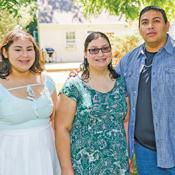Raquel Arevalo recalls her mother waking her and her sisters up so early that “we’d be in the van waiting for the sun to rise.” During summers in Ada, Minnesota, they worked in the sugar beet or soybean fields. In the fall they harvested apples in St. Joseph, Michigan. And in the winter they returned home to the Rio Grande Valley, completing their seasonal cycle of migrant farm work.
“It was a hard life, but it was a simple life,” says Arevalo, thirty-four. Today, she brings that experience to her job at the U-M, where she manages the HAIL Scholarship for low-income students and works with DACA and first-generation students.
“I love having these populations because I totally understand them and their questions,” she says, “but they need a lot of hand holding.” A “first gen” herself, with bachelor’s and master’s degrees from Michigan State, Arevalo volunteers for committees that work with U-M students who aren’t meeting scholarship standards—and draws on her own experience to advocate for them.
—
Born in McAllen, Texas, Arevalo is the fourth of five daughters. Their mother, Margarita, crossed the Rio Grande alone and undocumented at age twelve to work as domestic help for an American family. She gained a green card (and later her citizenship) through her marriage to Guillermo, whose father came to the U.S. to work in the California grape fields. They migrated with his family while raising a young family of their own.
Growing up, Arevalo split her school year between Michigan and Texas, and during the summers, she attended a migrant Head Start at a Minnesota high school. “I loved it there,” she says. “A lot of those people helped raise me from the time I was an infant.”
By the time she was twelve she was working in the fields. Legally she couldn’t work until she was thirteen, so her mother “made a game out of hiding from the farmer.”
They often ate Sunday dinner with the farmer’s family, visited their lake house for swimming and tubing, and she had sleepovers with their two daughters who were about her age. But the work could be grueling.
“There was one year that was so hot,” Arevalo remembers. “We were working off of one of the main roads, and we were seeing all the families driving off for the Fourth of July. It was terrible. They would wave at us” as they went by.
Immigrants, she says, “are not taking your jobs—we’re doing the jobs that people don’t want to do. Me, as an American, I never want to do it again.”
She’s always been outspoken. As a kid, she says, “My mouth would get me in trouble all the time. My mom would hit me for being so vocal.” Now that she and her husband, Edgar Galindo, are raising their daughter, Angelina Arevalo-Galindo, fifteen, who will be a freshman at Pioneer, she is trying “to be patient and to understand her and let her have her opinions.”
—
She met Galindo as a fourth grader in Texas. “I had a little crush on her,” he recalls. “She lived two streets away from me, and we’d talk on the bus. But all of a sudden one day she’d just be gone—her whole street would take off for months at a time” to do farm work in the north.
They started dating in high school. At the time, Galindo says he was “on the wrong path,” and he dropped out of school. Arevalo got pregnant near the end of her senior year; she graduated, and they married. He left Texas that summer to work with her family.
Even while pregnant, “she was working more than me,” he remembers. “I would have to take more breaks. It was so hard. I couldn’t compare it to any job I’d worked.”
During apple season, “she was up on tall ladders and picking so fast because you get paid by the box. Her mom was tough on her … I understand now that she was trying to build something for us and at the same time trying to please her family.”
The couple settled in Michigan, and Arevalo pushed Galindo to get his GED while she studied for her bachelor’s with help from friends who sometimes babysat Angelina. “She was a go-getter,” Galindo says. “She wasn’t scared. She wasn’t afraid to take that next step whether she failed or succeeded at it, and I liked that about her a lot.”
She went on for her master’s in higher education while Galindo worked on his bachelor’s at MSU, and she helped him to get support for his ADHD. During that time, she commuted to her job at U-M from their home in Pinckney, and Angelina went to Ann Arbor schools through the “schools of choice” program.
About a year ago, they moved to a rental home on Ann Arbor’s west side and are saving to buy a house. “I wanted her to have a normal school experience and participate in activities,” Arevalo explains. “It is expensive, but we really like it here.” Galindo is now a social worker for Samaritas, assisting unaccompanied refugee kids who are seeking citizenship.
—
Arevalo hasn’t ruled out more schooling someday so she could perhaps teach at the university level. She’s also interested in administration and policy work. “The bachelor’s was for my mother, the master’s was for Angelina because I want her life to be better, and the PhD would be for me.”
She says that when she was studying for her master’s, she took a course in resiliency that examined topics such as homelessness and food insecurity. For Arevalo, going to food pantries as a kid was just “normal life.”
“I think that class made me realize a lot about my life and what I had to go through,” she says. “I am totally resilient.”


